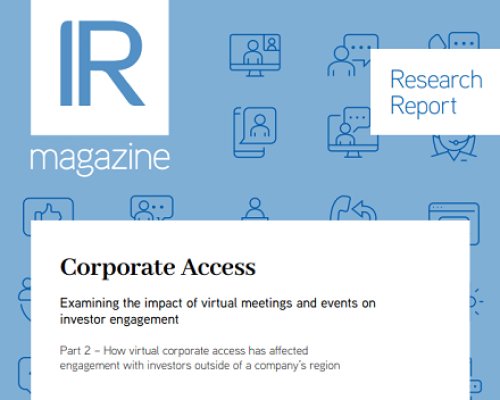With the mid-summer earnings reporting season coming to a close and much of the world still significantly impacted by Covid-19, company management teams and boards are grappling with a range of difficult questions that go to the very core of both corporate strategy and investor relations:
- How can quarterly results be contextualized to provide transparency and insight into management’s strategy for navigating near-term challenges?
- How big a role should potential countercyclical opportunities play in mid-crisis messaging?
- How can actions taken during these unexpected circumstances be situated within a company’s coherent long-term strategy?
- How much conviction is a company expected to have about market conditions in the months and quarters ahead?
- How can a company go beyond the headline numbers to demonstrate to investors how management’s strategy and intentions are being translated into leveraging the company’s brand strength, utilizing the differentiated expertise of its workforce, and strategic decisions related to cost controls and capital allocation?
The importance of communicating these critical issues calls for close consideration and a nuanced approach to both investor messaging and strategies for conveying the story to investors. While it’s an understatement to say that the Q2 earnings season, which represents the first full quarter impacted by Covid-19, is being closely watched by investors, issuers need to ensure that they continue to proactively tell their stories after the earnings call to both current and new investors, especially during a time when many companies have suspended earnings guidance and significant uncertainty remains.
Adding to these issues, many small and mid-cap issuers are also facing uncertainty determining how best to get in front of high-quality investors during a time when in-person conferences and non-deal roadshows have ceased to be an option. While the earlier adoption of Mifid II regulations forced both issuers and broker-dealers to begin thinking more critically about their hidebound investor relations practices and norms, the widespread adoption of social distancing beginning in March 2020 has required a more fundamental reassessment of the purpose and role of investor relations in a period wholly without precedent in the modern world:
- Do investors still want to engage with management if it has to be in a virtual setting? What do investors expect from issuers in a virtual one-on-one meeting?
- How can a virtual one-on-one play a meaningful role in getting an investor to an investment decision? What is the appropriate role of video?
- How can technology be utilized to create an effective and compelling virtual-only meeting or event, rather than just an inferior recreation of the traditional in-person event?
- Given the lack of physical or logistical restrictions, and armed with the vast capabilities of a wholly digital presentation, what constitutes the ideal virtual investor event?
In order to answer these questions and highlight emerging areas of investor consensus, The IGB Group recently conducted a snapshot survey of a diverse group of institutional investors as part of the ongoing IGB Hot Topics Series. Having earlier in the year looked into the various ways that emerging trends in and beyond financial markets have impacted investor outreach, messaging and quarterly earnings, we approached investors with a goal of ascertaining how investor expectations and the fluid nature of the ongoing pandemic had changed their understanding of what constitutes an effective and compelling interaction with company management, as well as how they now expect such interactions to come about.
Companies should take a proactive approach in continuing to engage with investors
Among the clearest takeaways from The IGB Group’s most recent survey was that investors remain eager for continued access to company management teams, expressing a unanimous view that continuing to hold virtual one-on-one meetings with investors amid the pandemic was either important or very important. A large majority of participants also urged companies to continue conducting large-scale investor/analyst days even if they are virtual, and a majority suggested that virtual meetings and events can be approximately as productive as in-person meetings. During a time when even the most sophisticated investors are facing a wide range of unknowns, continued access to management is seen to be far more important than the specific venue in which it takes place.
Interestingly, multiple investors pointed to the increasing role of direct engagement between companies and investors, supplementing traditional broker-sponsored corporate access and conferences. Drawing on longitudinal research into this topic, it is apparent that this trend has only accelerated since the onset of Covid-19. In fact, the IGB Group’s recent buy-side survey revealed a unanimous view that it is important for issuers’ IR representatives to reach out directly to the investment community to offer meetings with management, with two thirds of respondents describing this as a very important activity in the current climate.
To Zoom or not to Zoom?
Since the early days of widespread social distancing, the role of video – be it Zoom, Teams, WebEx, or any of a growing array of platforms – has been a constant topic of discussion and debate across all areas of business and social life. While an apparent pro-video consensus for meetings of all kinds emerged rapidly following the onset of lockdowns across the globe, that initial position has softened somewhat as audio-only meetings have retaken some degree of market share, even on platforms where full video capability is readily available.
While a similar dynamic has been at play in the realm of IR, the institutional investors who participated in The IGB Group’s recent survey expressed a clear preference for virtual one-on-one meetings and larger investor events to take place in a video-capable format. It was further noted that providing an audio-only option was seen to be an appropriate accommodation, so as not to alienate less technologically inclined investors or those who may not at a given time be in an environment conducive to video. Recent experience with virtual non-deal roadshows bears out that investors appreciate being able to opt into or out of a video interface to accommodate the realities of remote working.
Importantly, the majority of respondents expressed a heightened propensity to take part in a one-on-one meeting or larger investor event if it incorporated video, highlighting the importance of trying to assess management’s body language and visual cues in the process of analyzing a potential investment.
Think meat and potatoes, not bells and whistles
Having established both the continued importance of proactive investor engagement in a virtual context and the preference for the use of video during those meetings and events, issuers are then faced with the question of how best to utilize the numerous tools and capabilities available for virtual events. With sufficient budget and time, there are few limits to the kinds of exciting new visual representations, bespoke marketing content and interactive demonstrations that can be incorporated into or placed alongside a virtual investor event.
In assessing this exciting range of options, particularly in the context of a larger-scale investor/analyst day, it’s important that issuers maintain a focus on the central purpose of the event itself: conveying a compelling investment thesis in a way that addresses the prevailing issues and concerns of the time. The first question should not be, ‘What exciting new things can we do on a digital platform?’ but rather, ‘What would be useful to our investor audience and in line with our brand and investment reputation, and can we provide that in the context of a coherent virtual investor event?’
Outside of sectors such as technology or consumer goods where high-gloss marketing is frequently in and of itself a core competency, many investors subscribe to a set of norms hardened by decades of slide presentations and management Q&A sessions, with relatively little variation around the edges. With these experiences forming the basis of investor expectations, survey participants were highly consistent in defining those aspects of an investor-focused virtual event that are important to them:
- Interaction with a range of senior and operational management representatives in order to thoroughly assess both strategic direction and bench strength beyond the C-suite;
- A readily accessible, detailed and up-to-date presentation, providing a compelling standalone investment proposition and topical content to address salient issues in the market, while demonstrating the importance that the company places on its interaction with investors;
- Where relevant, a pre-recorded video that highlights notable products and service offerings, or otherwise provides insight into the company’s operational and marketing capabilities beyond what can be conveyed on a static slide or financial table.
Interestingly, while a strong majority of respondents suggested that more innovative or interactive elements would be of marginal value at best in the context of an investor event, it is notable that very few of these investors could readily recall an investor event wherein an innovative digital element was effectively utilized.
That finding, while not altogether surprising, supports this study’s final conclusion…
There is a clear role for innovation in raising the bar and changing expectations
In the world of investor relations, it is often taken for granted that investors tend to have a strong preference for the familiar and at least some portion of the audience will respond negatively to anything new and different. There is an interesting open question, however, that is suggested by the responses in The IGB Group’s most recent study and illuminated by notable real-world exceptions to the finding: are investors expressing skepticism about the value of innovation in investor events – virtual or otherwise – simply because they have not previously seen many examples where the innovative element fundamentally added value in a unique and interesting way?
Upon further examination of this hypothesis, investors have consistently expressed more openness when asked about specific hypothetical scenarios that would clearly support the investment thesis at the core of a presenting company’s investment proposition and that use technology to adapt and expand upon the best elements of in-person events, such as:
- A real-time or interactive virtual tour of a production facility or research center
- Live or pre-recorded virtual breakout rooms featuring deep dives on relevant issues or business segments
- A virtual showroom featuring interactive digital demonstrations of existing or upcoming product and service offerings
- A library of supportive video content not featured in the main body of the presentation (for example: customer testimonials, deep-dive case studies, explanatory content, consumer marketing)
- Live polls and dialogue functions that allow investors to convey questions and additional areas of interest in real time, allowing for responsiveness and dynamism beyond standard Q&A.
This strongly suggests that it is not so much the innovative or digital nature of a given supporting element that is determinative, but rather it is the extent to which it supports the effective and compelling communication of the company’s investment proposition and brand identity. It is incumbent upon a company to maintain this critical perspective and to incorporate only such additional elements as can reasonably be expected to have a net positive impact on investor perception – just as would be the case for a traditional, in-person event.
While it remains to be seen precisely how this prolonged period of social distancing will inspire issuers to innovate and expand the breadth of their investor event offerings, or whether any new developments will be sustained beyond the era of social distancing, there is for now a clear opportunity for companies to effectively innovate in order to convey a highly compelling and unique investment thesis in the wide open spaces of a virtual environment.
Leon Berman is founder and principal and Bryan Degnan is managing director at The IGB Group
This article originally appeared on The IGB Group website here [link: https://www.igbir.com/making-the-most-of-investor-meetings-and-events-in-the-covid-19-era/]











